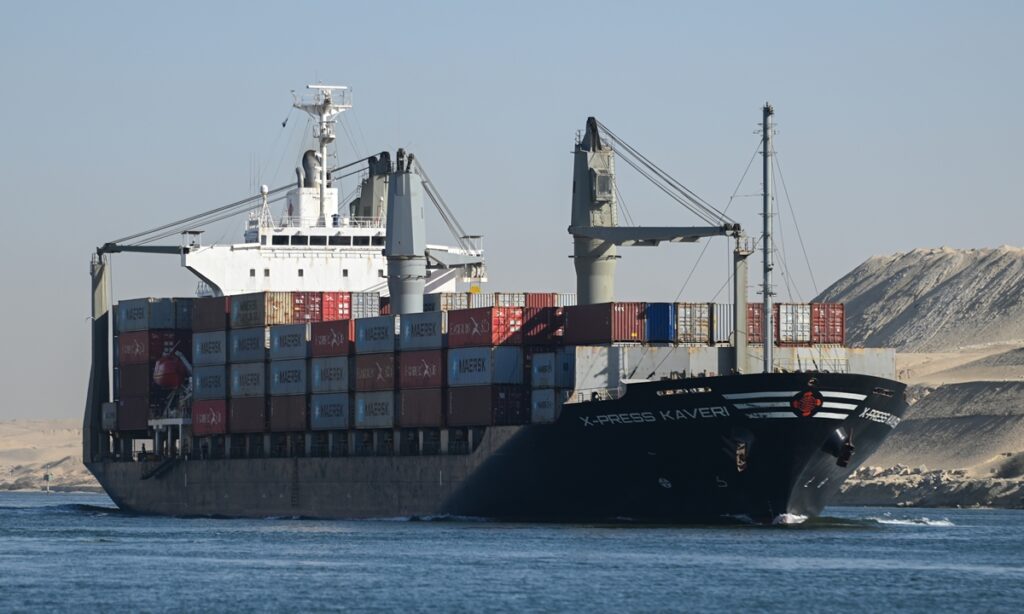Western media recently reported that the US has asked China to urge Tehran to rein in the pro-Iran Houthi militants, which are attacking commercial ships in the Red Sea, but has seen little sign of help from Beijing. Media reports say the US has repeatedly raised the matter with top Chinese officials in the past three months. The timing of the news is interesting, as the US has been organizing allied armed escorts in the Red Sea for over a month and conducting military strikes against the Houthi armed group for over two weeks, with little effect in terms of containment. The setback the US faces in the Red Sea coincides almost simultaneously with its pressure on China in public opinion, raising doubts about US’ true intentions.
The Red Sea is an important international trade route for goods and energy. The tense situation in the Red Sea harms the common interests of countries worldwide. Since the outbreak of the Red Sea crisis, China has maintained close communication with all parties involved to ease tensions and has made proactive efforts. China has consistently called for an end to the attacks on civilian vessels and urged relevant parties to avoid exacerbating the tense situation in the Red Sea, in order to jointly safeguard the security of the Red Sea waterway. If the US wishes to cooperate with China to jointly promote a peaceful resolution of the Red Sea crisis, its message would be better received without irritable or ambiguous undertones. It is also absurd to complain about China’s actions in this matter.
The US has always paid special attention to China’s relationship with Iran, but most of the time, it views the ties through biased lens. Normal cooperation between China and Iran has constantly been demonized by the US, and normal economic and trade exchanges have repeatedly faced Washington’s sanctions under the “long-arm jurisdiction,” as if any contact between China and Iran is viewed unfavorably by the US. However, since the recent escalation of the Israel-Palestine conflict, US officials have repeatedly asked China to leverage this relationship and exert “influence” on Iran. If they believe the expected results are not achieved, they even criticize China. This obvious contradiction is a perfect portrayal of US’ selfishness and double standards on the international stage.
The US is driven by a sense of urgency, so it presented inconsistent images, urging China to increase mediation efforts. The recent US airstrikes against Houthi forces have not yielded the expected results, and attacks on commercial ships have not diminished. Several Western media outlets have commented that military strikes will only backfire. Pentagon officials also admitted that the military campaign against the Houthi forces is not working. The envisioned image of the “Guardians of Prosperity” by the US in launching escort operations has turned into emptiness, leaving behind a figure increasingly passive and struggling to cope in the Red Sea.
It is not surprising that the US finds itself in such a situation because it either fails or refuses to recognize the root cause of the Red Sea crisis. While Houthi forces are responsible for harassing civilian ships, the crisis stems from the overflow of the Gaza conflict. All parties need to return to the core issue of achieving an immediate ceasefire and implementing the “two-state solution” for the Palestinian-Israeli conflict. If the US does not grasp this point and continues to intensify military strikes against the Red Sea stakeholders, the result will only be to perpetuate a cycle of escalating violence. Moreover, concerning the core issue of the Gaza conflict, the US has yet to demonstrate a sincere stance toward peace and dialogue, contributing to the escalating tensions in the Red Sea region.
Since the Russia-Ukraine conflict, the US has consistently sought to bring China into its strategic agenda in almost every major geopolitical conflict, hyping the “China responsibility” theory. On issues that are beneficial to both countries and the world, China never refuses to cooperate with the US. On the contrary, China often takes the initiative to fulfill its responsibilities through collaboration. The US’ complaints in this regard are largely an attempt to shift the responsibility for regional crises onto China, reflecting a habit by the US in recent years when it has misjudged or has been ineffective in dealing with regional crises.
The US has long been concerned about China filling the so-called “power vacuum” it left in the Middle East. Consequently, it consistently demonizes normal cooperation between China and regional countries, seeking to counterbalance China’s “influence” in the region. The current facts further prove that China firmly supports regional countries in resolving regional hotspot issues through political means. China supports mutually beneficial and win-win development between regional countries and itself. This approach is more appealing than the US’ practice of creating “exclusive circles” and playing off one faction against another in the region. It genuinely contributes to achieving peace and stability in the region.




